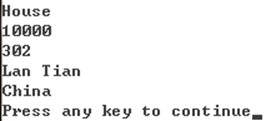● 构造数据类型概念
Structured data types 构造数据类型
结构体(structure), 联合体/共用体 (union), 枚举类型(enumeration type), 要有意识这三者是数据类型
|
Union is also like structure, i.e. collection of different data types which are grouped together. Each element in a structure or a union is called member. • Structure allocates storage space for all its members separately. • Whereas, Union allocates one common storage space for all its members |
● 结构体使用场景
|
无论是基本数据类型还是数组都仅仅描述了事物某一方面的特性, 但是, 一种事物往往具有多方面的属性, 如一个同学有学号, 姓名, 性别, 年龄等属性. |
||
|
定义形式: struct union_type_name { member_type member_name_1; member_type member_name_2; ... member_type member_name_n; };
结构体变量的定义 & 结构体成员的初始化, 例如:
|
||
● 结构体成员初始化的两种方法
|
//结构体变量名.成员名 #include <iostream> using namespace std;
void main() { struct person_info { int index; char name[30]; short age; }; person_info p_info; //也可以写成struct person_info p_info; p_info.index=1; strcpy(p_info.name,"Jim"); //位字符数组赋值需要使用字符串复制函数strcpy(), 否则会提示: cannot convert from 'char [4]' to 'char [30]' p_info.age=20;
cout << p_info.index<< endl; cout << p_info.name << endl; cout << p_info.age << endl;
cout<<sizeof(person_info)<<endl; cout<<sizeof(p_info)<<endl; //结构体类型和结构体变量的大小都是36字节, 即4+30+2=36 }
/* 可以在声明一个结构体变量后赋值: struct person_info { int index; char name[30]; short age; }; person_info p_info={1,"Jim", 20}; */ /* 也可以在定义结构体变量时直接对成员赋值: struct person_info { int index; char name[30]; short age; } p_info={1,"Jim", 20};*/ |
//结构体指针变量->成员名 //在定义结构体的同时, 声明结构体指针变量 #include <iostream> using namespace std;
void main() { struct person_struct { int index; char name[30]; short age; }*p, p_info={1,"Jim",20}; p=&p_info; cout <<p->index << endl; cout <<p->name << endl; cout << p->age << endl; cout <<(*p).index << endl; cout <<(*p).name << endl; cout <<(*p).age << endl;
cout << sizeof(p) << endl; cout << sizeof(p_info) << endl; }
//也可以写成: struct person_info { int index; char name[30]; short age; }; person_info p_info={1,"Jim",20}; struct person_info *p=&p_info; //一定要写定义的结构体类型名, 不能写成struct *p=&p_info; |
|
|
|
|
总之, 在上述案例中, 访问结构体成员有下面三种方法: ① p_info.index; ② p->index; ③ (*p).index; ② 当一个结构体类型定义完成后, 如果要使用这个类型, 保留字struct在C语言中必须使用,而在C++中则可被省略不写。 |
|
● 结构体的嵌套, 子结构体(sub-structure)
|
#include <iostream> using namespace std;
void main() { struct person_info { int index; char name[30]; short age; struct work_place { char address[150]; char postCode[30]; char gateCode[50]; char street[100]; char area[50]; }WP; //子结构体(sub-structure) };
person_info p_info; //p_info是person_info结构体类型变量 strcpy(p_info.WP.address,"House"); //可以把WP看作是p_info变量的子变量(sub-variable) strcpy(p_info.WP.postCode,"10000"); strcpy(p_info.WP.gateCode,"302"); strcpy(p_info.WP.street,"Lan Tian"); strcpy(p_info.WP.area,"China");
cout << p_info.WP.address << endl; cout << p_info.WP.postCode << endl; cout << p_info.WP.gateCode<< endl; cout << p_info.WP.street << endl; cout << p_info.WP.area << endl; } |
|
|
● 结构体变量作函数参数
|
#include <iostream> using namespace std;
struct person_info //定义结构体 { int index; char name[30]; short age; }; void show_stuct_message(struct person_info my_info) //自定义函数,形参是结构体变量my_info, 输出结构体变量成员, 不返回值 { cout << my_info.index << endl; cout << my_info.name << endl; cout << my_info.age<< endl;
} void main() {
person_info p_info; //声明结构体变量p_info, 作为形参 p_info.index=1; strcpy(p_info.name,"Jim"); p_info.age=20; show_stuct_message(p_info); //调用自定义函数 } |
|
|
● 结构体指针做函数参数
|
#include <iostream> using namespace std; struct person_info { int index; char name[30]; short age; }; void show_struct_message(struct person_info *my_info) { cout << my_info->index << endl; cout << my_info->name << endl; cout << my_info->age<< endl;
} void main() {
person_info p_info; p_info.index=1; strcpy(p_info.name,"Jim"); p_info.age=20; show_struct_message(&p_info); } |
|
|
● 结构体数组的声明与引用 & 指针访问结构体数组
|
结构体数组: 每个元素都是结构体变量的数组 //定义结构体数组的一般形式: struct 结构体名 { 成员列表; }数组名;
struct Student //可以把Student这个结构体名省略 { char name[20]; int number; char sex; int grade; }student[5];
//结构体数组中各数据在内存中的存储是连续的,例如:
|
|
#include <iostream> using namespace std;
void main() { struct person_info { int index; char name[30]; short age; }p_info[5]={{1,"Jim",20}, //p_ifno是一个结构体数组 {2,"Eric",21}, {3,"Peter",22}, {4,"Amy",22}, {5,"Lucy",22}};
struct person_info *p; p=p_info; //p_info是一个结构体数组名, 因此就代表一个地址值 for(int i=0;i<5;i++,p++) { cout << p->index << endl; cout << p->name << endl; cout << p->age << endl; } } |
|
|
● 共用体变量的大小
|
所有共用体在同一时刻只能有一个值, 它属于某一数据成员, 不过其它成员会共享这个值, 只是会转换成这些成员的数据类型 共用体变量的大小是其最大成员的大小. 联合体使用场景: 例如通信中的数据包会用到共用体, 因为不知道对方会发一个什么数据类型的包过来,用共用体的话就很简单了,定义几种格式的包,收到包之后就可以直接根据包的数据类型取出数据。 |
||
|
定义形式: union union_type_name { member_type member_name_1; member_type member_name_2; ... member_type member_name_n; };
联合体变量的定义, 例如:
|
||
|
#include<stdio.h>
union data_union /*声明共用体类型*/ { int a; /*成员变量*/ char b; };
int main() { union data_union my_union; /*定义共用体变量*/ my_union.a=97; /*为共用体变量中成员赋值*/ printf("a: %d\n",my_union.a); /*输出成员变量数据*/ printf("b: %c\n",my_union.b); my_union.b='A'; /*改变成员的数据*/ printf("a: %d\n",my_union.a); /*输出成员变量数据*/ printf("b: %c\n",my_union.b); printf("sizeof(data_union): %d\n",sizeof(data_union)); printf("sizeof(my_union): %d\n",sizeof(my_union)); return 0; } |
||
|
|
● 枚举类型(enumeration type)
|
使用场景: 很多集合描述的状态为有限几个, 例如比赛结果只有输, 赢和平手三种状态; 一周只有七天等等. |
|
● 枚举类型是一些标识符的集合, 这些标识符代表整型常量. 声明形式: ① 标识符没有被赋值 enum 枚举类型名 {枚举常量1, 枚举常量2,…, 枚举常量n}; enum enumeration_type_name { enumeration_constant_1, enumeration_constant_2, ..., enumeration_constant_n} 例如: enum weekday {Sunday, Monday, Tuesday, Wednesday, Thursday, Friday, Saturday}; 如果标识符没有被赋值, 标识符会被自动赋值为从0开始的整型常量 ② 标识符被赋值 enum enumeration_type_name //方括号(中括号)内的内容可以写或不写 { identifier[=integral constant], identifier[=integral constant], ... identifier[=integral constant], }; 上面的枚举类型声明相当于: enum Weekday {Sunday=0, Monday=1, Tuesday=2, Wednesday=3, Thursday=4, Friday=5, Saturday=6}; 也可以自己赋值, 如: enum Weekday {Sunday=2, Monday=3, Tuesday=4, Wednesday=5, Thursday=0, Friday=1, Saturday=6}; 如果只给前几个标识符赋值, 编译器会给后面的标识符自动累加赋值, 例如: enum Weekday {Sunday=7, Monday=1, Tuesday, Wednesday, Thursday, Friday, Saturday}; 相当于: enum Weekday {Sunday=7, Monday=1, Tuesday=2, Wednesday=3, Thursday=4, Friday=5, Saturday=6};
● 枚举类型变量(enumeration variable/enum variable) enum Weekday {Sunday, Monday, Tuesday, Wednesday, Thursday, Friday, Saturday}; Weekday myworkday; 也可以去掉上面花括号后面的分号, 然后直接写变量的标识符: enum Weekday {Sunday, Monday, Tuesday, Wednesday, Thursday, Friday, Saturday} myworkday;
注意:① 在C语言中, 还需要写关键字, 即: enum weekday myworkday; ② 枚举变量的值只能在Sunday和Saturday之间, 即一个整型数据不能直接赋给一个枚举变量, 不过可以先将一个整型常量强转为Weekday枚举类, 然后再赋值. |
● 枚举类型的声明, 枚举类型变量的声明及其运算
|
#include <iostream> using namespace std;
void main() { enum Weekday {Sunday,Monday,Tuesday,Wednesday,Thresday,Friday,Saturday}; int a=2,b=1; Weekday day;
day=Tuesday; cout<<day<<endl;
day=(Weekday)a; //将整型的a强转为Weekday类型 cout << day << endl;
day=(Weekday)(Sunday+Wednesday); //Sunday+Wednesday后得到一个整型常量, 因此也需要强转 cout << day << endl;
day=(Weekday)5; //等价于day=(enum Weekday)5; 输出Weekday的第5个标识符代表的整型常量(从0开始计数) cout << day << endl;
Weekday another_day; another_day=Tuesday; cout<<day-another_day<<endl;
cout<<sizeof(Weekday)<<endl; cout<<sizeof(another_day)<<endl; //enum类型的长度以及每个enum类型变量的长度都是一个枚举常量的长度, 即sizeof(int)=4; } |
|
|











 posted on
posted on

 浙公网安备 33010602011771号
浙公网安备 33010602011771号